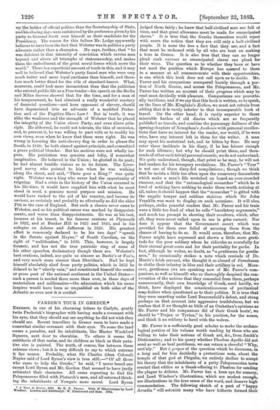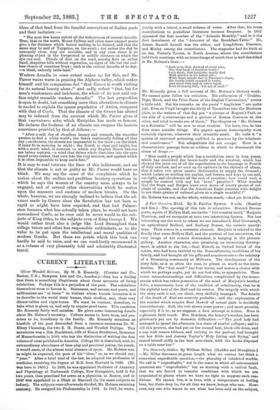FARRER'S TOUR IN GREECE.* EMERSON, in one of his, charming
letters to Carlyle, gently twits Frederick's biographer with having made a covenant with his eyes, that they should not see anything he did not wish they • should see. Recent travellers in Greece seem to have made a somewhat similar covenant with their eyes. To some the land seems a paradise, and its inhabitants, like Master Wackford Squeers, next door to cherubim. To others it seems the antithesis of that realm, and its children as black as their puta- tive sire is painted. The truth, of course, lies between these extreme views ; but it is very difficult to say to which extreme it lies nearer. Probably, what Sir Charles (then Colonel) Napier said of Lord Byron's view is true still :—" Of all those who came to help the Greeks," he said, "I never heard one except Lord Byron and Mr. Gordon that seemed to have justly estimated their character. All came expecting to find the Peloponnesus filled with Plutarch's men, and all returned think- ing the inhabitants of Newgate more moral. Lord Byron
• A 1bur in Greece, 1880. By R. B. Ferrer. With 27 Illustrations by Lord Windsor. London and Edinburgh : W. Blackwood and Sons. MS. judged them fairly; he knew that half-civilised men are full of vices, and that great allowance must be made for emancipated slaves." It is true that the Greeks themselves would reject with scorn the notion that they are still only a half-civilised people. It is none the less a fact that they are, and a fact that must be reckoned with by all who are bent on making a tour in Greece. It is also true that they can no longer plead such excuses as emancipated slaves can plead for their vices. The question as to whether they have or have not used the position which Europe has assured to them in a manner at all commensurate with their opportunities, is one which this book does not call upon us to decide. Mr. Farrer and his companions scampered hastily through a por- tion of North Greece, and across the Peloponnesns, and Mr. Farrer has written an account of their progress which may be read most decidedly with pleasure. Comparisons are proverbi- ally invidious, and if we say that this book is written, so to speak, on the lines of Mr. Kinglake's Milton, we must not refrain from adding that it is vastly inferior to that incomparable book of travel. On the other hand, it is vastly superior to those miserable hashes of old diaries which are so frequently published as travels, and combine the parasangy dullness of the opening chapters of Xenophon's Artabasis with personal recollec- tions that have no interest for the reader, nor would, if he were wise, have any interest left in them for the writer. A man may upset his matntinal tub, and be bitten by fleas. He may enter these incidents in his diary, if he has leisure enough for such idleness ; but why he should print them, and thou- sands of other such trivial personal records, we do not understand. We quite understand, though, that print as he may, he will not find readers for his trumpery revelations. Mr. Farrer's "Tour" is not one of these diary-fed compilations ; though we think that he insists a little too often upon the unsavoury discomforts which make a man's life wretched on board an over-crowded steamer, and that the "entomological researches" which he is fond of noticing have nothing to make them worth noticing at all, unless it should happen that the "researcher" is gifted with the angelic temper and sublime stoicism which Sir John Franklin was wont to display on such occasions. It will also, perhaps, strike peaceful readers that Mr. Farrer and his train were a little too fond of what he calls " bacnlatory arguments," and much too prompt in showing their revolvers, which, after all, they were never called upon to use in grim earnest. Nor does it appear that the Government escort which was provided for them ever failed of securing them from the chance of having to do so. It would seem, therefore, that Mr. Farrer might have expressed and shown a little more grati- tude for the poor soldiery whom he ridicules so scornfully for their eternal great-coats and for their partiality for garlic. In fact, although he writes, no doubt, as "a gentleman for gentle- men," he occasionally strikes a note which reminds of Dr. Morris's Irish servant, who thought it so absurd of Frenchmen to clothe their infantry in blue and their artillery in red. More- over, gentlemen (we are speaking now of Mr. Farrer's com- panions, as well as himself) who so thoroughly despised the con- versation of the natives that they concealed from them, perhaps unnecessarily, their own knowledge of Greek, need hardly, we think, have displayed the conscientiousness of puritanical soap-boilers when questioned as to their politics. It is true that they were smarting under Lord Beaconsfield's defeat, and stung perhaps on that account into aggressive truthfulness, but we confess that if we thought as little of an Otaheitan's opinions as Mr. Farrer and his companions did of their Greek hosts', we should be "Trojan or Tyrian," in his position, for the nonce,
and think it no robbery to howl with the wolves. •
Mr. Farrer is a sufficiently good scholar to make the archaso- logical portion of his volume worth reading by those who are willing to take their notions of Greek art, &c., from Smith's Dictionaries; and to his query whether Phcebus Apollo did not send as well as heal pestilence, we can return a cheerful "Why, cert'nly." But it, propos of the question which he discusses, in a long and for him decidedly a pretentious note, about the temple of that god at Phigalia, we entirely decline to accept his theory that the inhabitants of a petty Peloponnesian town erected that edifice as a thank-offering to Phcebns for sending the plague to Athens. Mr. Farrer has a keen eye for scenery, and Lord Windsor's illustrations, which are modest enough, are illustrations in the true sense of the word, and deserve high commendation. The following sketch of a part of "happy Arcadia" will astonish many who have hitherto formed their
ideas of that land from the fanciful conceptions of Italian poets and their imitators :—
"The next few hours unfold all the hideousness of central Arcadia. True, that on the north, Mount Cyllene and other snow-capped peaks give a far distance which leaves nothing to be desired, and that the same may be said of Taygetus, on the south ; but unless the day be unusually clear, they are invisible, and in any case there is no pleasing object in the foreground or middle distance on which the eye can rest. Clouds of dust on the road, marshy flats on either band, shapeless hills without vegetation, no signs of life but the end- less chorus of countless frogs ; such is the central Arcadia of to-day, —a bleak, unlovely table-land."
Western Arcadia to some extent makes up for this, and Mr. Fairer waxes warm in praising the Alpheus valley, which makes himself and his companions feel "that Greece is worth visiting for its natural beauty alone ;" and sadly reflect "that, but for man's wantonness and indolence, the whole of its now arid sur- face might resemble western Arcadia." The last proposition is open to doubt, but something more than alterations in climate is needed to explain the sparse population of Attica, compared
with that of Corfu. That the climate of the former has altered may be inferred from the account which Mr. Farrer gives of that Aapvp4rcero; cake which Euripides has made so famous.
He declares the foulness of no climate can surpass the horrors sometimes provided by that of Athens
After a still day of cloudless beauty and warmth, the traveller awakes to find a white world ; the flakes continually falling all that day ; on the next, the streets are impassable in the thaw ; on the third, it rains from morning to night ; the fourth is clear and bright, but with a north wind, in contrast to which any English March breezes are balmy zephyre, —a wind that drives whole dust-bins into the eyes round every corner, that cuts into the very marrow, and against which it RI often impossible to keep one's feet."
It is easy to read between the lines of this indictment, and see -that the climate is not so guilty as Mr. Parrer would have -us think. We may say the same of the complaints which he makes about the endless and profitless lavatory operations in which he says the women of the country seem always to be
engaged, and of several other observations which he makes upon the manners and customs of modern Greeks. On the whole, however, we are strongly inclined to believe that the ad- vance made by Greece since the Revolution has not been so rapid as might have been expected, and that had Palmer- ston foreseen what has actually taken place, be would not have surrendered Corfu, as he once said he never would to the sub- jects of King Otho, to the subjects even of King George I. We would rather trust also a judge like Lord Strangford than college tutors and other less responsible enthusiasts, as to the value to be put upon the intellectual and moral qualities of modern Greeks. But these are points which this book can hardly be said to raise, and we can confidently recommend it as a volume of very pleasantly told and admirably illustrated travel.



































 Previous page
Previous page